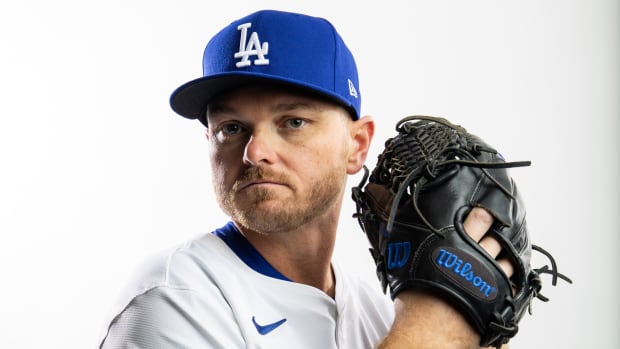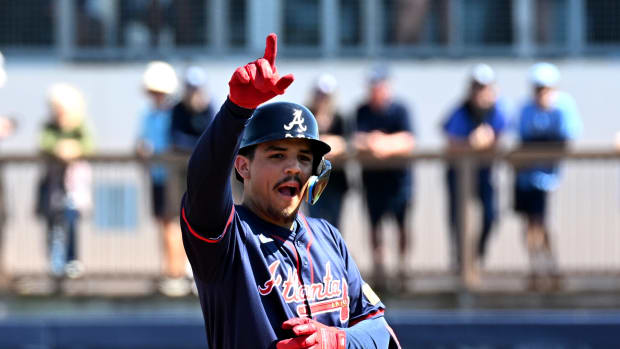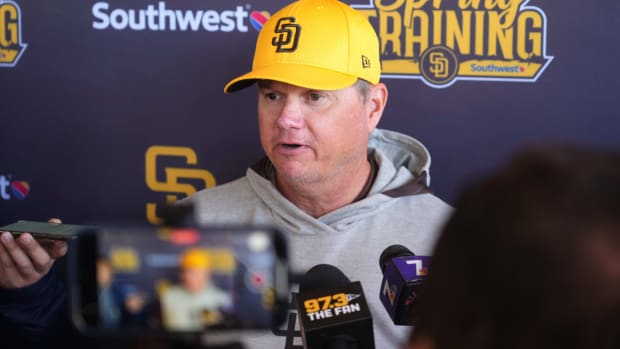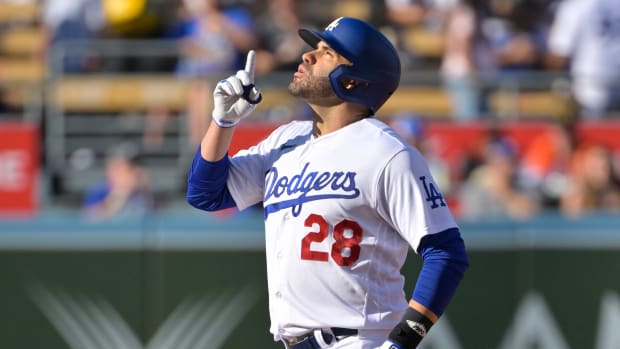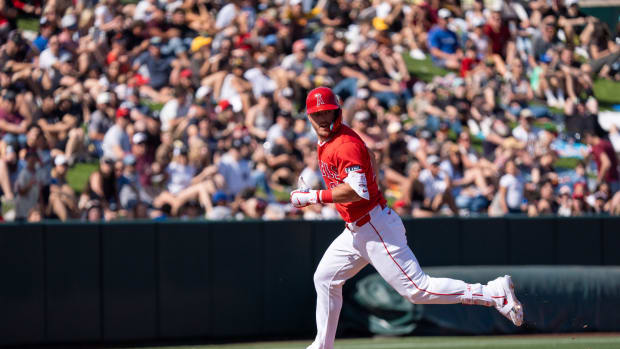Tired bullpen logic costs Yankees in extras in Baltimore
Get all of Cliff Corcoran’s columns as soon as they’re published. Download the new Sports Illustrated app (iOS or Android) and personalize your experience by following your favorite teams and SI writers.
Coming off a 7–0 win over the Orioles on Wednesday, the Yankees battled Baltimore to a scoreless tie over the first nine innings of their series finale at Camden Yards Thursday night. A win in extra innings would have given the Yankees their first consecutive wins since April 22–23 and just their third series win of the season. Since opening the season 4–2, the Yankees had gone 5–14, the worst record in baseball over that stretch.
The Yankees needed that win, badly, and had to that point used their best pitchers in pursuit of it. Masahiro Tanaka, in his best start of the young season, contributed eight scoreless innings, scattering five singles and a walk while striking out seven. Dellin Betances followed with a scoreless ninth. With New York having lost six games in a row prior to its blowout win on Wednesday, closer Andrew Miller, who had not allowed a run to score all season, had pitched just once since April 25 and not at all since a 15-pitch outing last Friday.
Why Yankees look doomed, plus more PED busts, news and notes
So who came out of the Yankee bullpen to start the bottom of the 10th inning with the game still locked in a scoreless tie? Johnny Barbato, a rookie with 12 major league innings under his belt who had allowed seven runs in his last six innings of work. Why? Because the one piece of baseball orthodoxy that has proven most impervious to the progressive thinking that has infiltrated (and to my mind, improved) the game over the last two decades is the managerial maxim that you don’t use your closer in a tie game on the road.
In this game, Yankees manager Joe Girardi was ejected in the fourth inning for arguing that Orioles starter Kevin Gausman was balking from the stretch, but made no pretense about not continuing to call the shots from the clubhouse. When asked about Barbato pitching the 10th inning, Girardi explained that by asking Miller to start the 10th inning, he would have effectively been asking him to pitch two innings should the Yankees manage to take the lead in the top of the 11th, setting up a save situation. “I can’t ask him to go two innings there,” said Girardi.
I swoon at the number of things wrong with that logic. To begin with, why can’t a manager ask a healthy pitcher who had thrown just 15 pitches in the last nine days to pitch two innings? Girardi asked Miller to pitch two innings on April 29 of last season, one of four six-out appearances by Miller last season. Miller responded by striking out three in two perfect frames. Second, and just as importantly, who says Miller is the only pitcher who can pitch in a save situation for the Yankees?
• CHEN: Scout’s Takes: What A-Rod’s move to DL means for Yankees
The most important thing Girardi seemed to be overlooking, however, was the fact that it is much more important to keep your opponent from scoring in the ninth inning or beyond when tied on the road than is to keep them from scoring when you have the lead at that point in the game. Yes, with the lead a scoreless inning can deliver a win, but with the game tied, those are sudden-death innings. A single run by your opponent results in a loss the instant that runner touches home plate. With the lead, a single run, at worst, prolongs the game. If it’s a multi-run lead, you can give up a run, or even multiple runs, and still win. In a tie, however, there is no margin for error. Put simply, there is no higher-leverage situation a pitcher can enter to start an inning than being tied on the road in the ninth inning or beyond.
The managerial maxim for tied games on the road should be: you can’t win if you’ve already lost. That’s what happened to the Yankees Thursday night. Barbato gave up a pair of singles to put runners on the corners with no outs. Bench coach Rob Thomson, one assumes at Girardi’s behest, belatedly called in Miller. However, with a man on third, Pedro Alvarez’s lazy fly ball was enough to score pinch-runner Nolan Reimold from third with the wining run. The Orioles won 1–0, halting New York’s winning streak at one game and dropping the Yankees to 1–7 over their last eight games and 5–15 (.250) since the season’s first week.
Explaining MLB's recent wave of PED bans, and what league can do
This isn’t just about what the Yankees did Thursday night. In fact, this was already the second time this season that the Orioles had benefited from a visiting team failing to prioritize the use of their closer in an extra-inning game. On April 20, the Blue Jays brought in Joe Biagini before Roberto Osuna in the 10th inning and suffered a 4–3 loss without Osuna throwing a pitch. This misapplication of high-leverage relievers in sudden-death innings on the road has been epidemic in baseball for decades (Game 4 of the 2003 World Series likely leaps to mind for many Yankee fans). I find it inexplicable. No, using your closer in a tie game on the road doesn’t guarantee a win, and yes, another pitcher may be less likely to convert the save if you do ultimately get a lead, but giving his team the chance to get that lead is the most important job of a manager in extra innings.
The pitcher who gives your team the best chance to get that opportunity is the best pitcher available in your bullpen, whoever that may be at that point in the game. Except in situations in which his closer is completely unavailable, a manager should be embarrassed to have his team suffer an extra-inning loss without his closer appearing in that game. Girardi at least got Miller in the game Thursday night, but the horse was out of the barn by that point. Rather than reserving one’s closer for a save situation, the automatic move should be to make the closer the first man out of the bullpen once the game reaches sudden-death. Sadly, we’re still waiting for the day that is true in major league baseball.






























